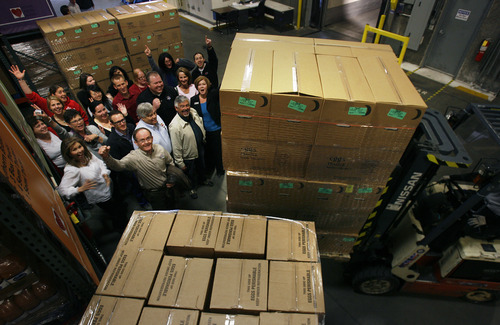This is an archived article that was published on sltrib.com in 2013, and information in the article may be outdated. It is provided only for personal research purposes and may not be reprinted.
Utah farmers gave needy families an Easter gift this week — 200,000 eggs that children may color, place in baskets and eat as a nutritious holiday snack or meal.
All Utahns, meanwhile, benefit from the state's egg industry.
More than 3.5 million chickens laid about 975 million eggs in 2011, worth $72.2 million and almost enough for each state resident (2.8 million) to have one egg per day.
"This is one of food products in Utah where we are self-sufficient, meaning we raise enough to feed our entire population," said Larry Lewis, spokesman for the Utah Department of Agriculture and Food.
On Wednesday, several farmers delivered dozens of pallets of eggs to the Utah Food Bank, to be distributed to 129 pantries and agencies throughout the state.
"We help whenever we can," said Corby Larsen of Fassio Egg Farms, headquartered in West Valley City. "All kids should be able to have fresh eggs throughout the year, and especially for the Easter holiday."
Fassio, Oakdell Egg Farms in North Salt Lake, Shepherd's Egg Farm in Spanish Fork, Delta Egg Farm and other Utah farmers donate fresh eggs year round, providing a valuable food product for needy families.
"We're so grateful for the continued year-round support of local egg farmers," said Karen Sendelback, CEO of Utah Food Bank. "We are fortunate to be able to distribute such a great, high protein product as part of the emergency food program."
Fresh eggs are always a prized item for food banks because of their dense nutritional and high protein content. One large egg delivers six grams of protein and 13 essential nutrients such as choline, folate, iron and zinc.
Eggs also are one of the most difficult of food categories for pantries to acquire, said Genette Bott, the Utah Food Bank's chief marketing officer.
Last year, the Utah Food Bank distributed 34.4 million pounds of food and goods, the equivalent of 28 million meals for families and individuals in need last year. The Food Bank also served nearly 18,600 children's meals, delivered 43,740 food boxes and filled 43,000 kids' backpacks for weekends and school holidays.
To help needy families, farmers who are members of the national trade association United Egg Producers (UEP) have donated nearly 9 million fresh eggs this year, bringing the number of donations since 2008 to 69 million eggs.
Utah farm members also contributed during the Great Recession — even though state production levels were down to 914 million eggs in 2008, compared to 925 million eggs in 2009 and 929 million in 2010.
In 2011 (the most recent available figures) Utah farmers have had a banner year, with the 957 million eggs they produced up 5 percent from the previous year. By contrast, egg production nationwide totaled 91.9 billion eggs, up only slightly from 2010.
The average production in Utah, per layer, was 281 eggs, up 3 percent from the year before, according to the Utah Agricultural Statistics Service.
UEP members in Utah and nationwide produce eggs using various systems, including conventional cage production, enriched cages, cage-free, free range and organic.
Currently the UEP is asking Congress to amend the Egg Products Inspection Act which would require egg laying hens to have more space and allow them to perform their natural behaviors such as perching, scratching and laying their eggs in a private nest box area.
twitter@DawnHouseTrib —
Utah eggs
Production • Five-year average is 940 million eggs
Number of layers • 3.5 million
Banner year • 2011 with 975 million eggs
Worst year • 1924 with 142 million eggs
Source: Utah Department of Agriculture and Food —
Donate
Utah Food Bank • Can turn each $1 donation into $8 worth of food and services. Visit utahfoodbank.org
United Egg Producers • Pledge to buy UEP-certified eggs and the trade group will donate one carton of eggs to a food pantry. Visit http://www.facebook.com/UEPCertified



